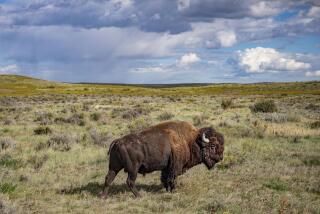BIOGRAPHY : The Essential Frontiersman
- Share via
In many respects John Mack Faragher’s “Daniel Boone” is less a conventional biography than a vivid parable of frontier life. Important and difficult questions about our role as a people in shaping the recent development of this continent are posed in these pages. Faragher’s honesty, fairness and sensitivity in “reading” Boone’s life supply not so much a definitive answer to such provocative and unsettling questions, as a sense that in confronting them we are being accompanied by a trusty, knowledgeable and thoughtful guide.
A professor of history at Mount Holyoke College, Faragher is the author of “Men and Women on the Overland Trail,” which received the Frederick Jackson Turner award, and the widely acclaimed “Sugar Creek: Life on the Illinois Prairie.” He is an accomplished scholar who approaches this job--the first full-scale biography of Boone since Richard Bakeless’ classic study done in the 1930s--well-equipped with the methods of contemporary anthropology and cultural history. His unblinking registration of the harsh, often squalid and not infrequently brutal aspects of pioneer life reveals much unvarnished truth beneath the stereotypical frontier images. While crediting the efforts of the advancing settlers in carving out a nation, Faragher never allows us to forget that this nation is being carved forcibly from the traditional lands of indigenous peoples. And, in his extensive use of folklore and oral transmission as sources, he deftly explores the intimate relation between popular myth and national identity, observing tellingly how the Boone story’s curious “inherently elusive quality” has allowed Americans to discover in it many significant truths about their deeper aspirations, regrets and longings.
Daniel Boone was born in 1734 in a one-room log cabin in the upper Schuylkill River valley of Pennsylvania. The Boones, a family of immigrant Cornish Quaker weavers and tenant farmers, congregated in that valley, and were notable for their clannishness--a strong extended-family bonding that interpenetrated with community life in ways that for Daniel became a template of civic responsibility, counterbalancing and over the years often conflicting with the image of freedom represented for him by the solitary life of the wilderness.
The first and perhaps most accurate and lasting of many legends to attach themselves to Boone’s name was his reputation for woodcraft. The forest was his classroom. His famous illiteracy was no more than a myth--he knew how to read well enough to enjoy many fireside hours in lonely wilderness encampments with his favorite book, “Gulliver’s Travels,” that Ur-text of 18th-Century geographical curiosity--but he had little patience with orthodox education, and could not abide school for long. As a strapping lad of 15 he was already known as one of the best backwoods hunters in the region of his birth.
Given a “short rifle gun” by his father in his 12th or 13th year, he became an excellent marksman, his growing “love for the chase” soon inducing him to neglect the cows and take off on his own into the woods, reappearing with enough game to supply the family with meat for a week.
Quaker traditions of tolerance lay behind a family attitude in the Boone clan of respect toward the natives who inhabited the woods surrounding their Schuylkill settlements.
The adult Boone, as Faragher shows, though often finding himself forced into the reluctant role of “Indian fighter” (usually in defense of his family’s lives or his own), was never an “Indian hater.” On this point the biographer cites Boone’s own simple declaration in old age that he had “never delighted in shedding human blood” and had “avoided it whenever he could”; he had taken some Indian lives, he acknowledged, but was “very sorry to say that I ever Killed any, for they have always been kinder to me than the whites.” Even when directly (and sometimes violently) contending with native peoples for the abundant natural riches of the forests, Boone managed to regard them as no worse than friendly rivals, and was able without particular inconvenience to live as they did--or even to live among them in one period of four month’s semi-voluntary “captivity” during which he became a Shawnee chief’s adoptive son.
In the late 1740s, after the Boones’ Pennsylvania community ties were dissolved by the expulsion of his father from the Quakers, Daniel guided kith and kin on the first of several clan migrations he would lead in his lifetime, southwest over the Allegheny trail into backcountry North Carolina. Within two decades, increasing settlement of Carolina had forced the Boone clan further west, across the Blue Ridge into the fertile, Edenic country of Kentucky. Boone conducted the advance party of a great migratory wave--it would soon swell to some 300,000 settlers, many of them following his trans-Appalachian route--over the Wilderness Road, which he cut himself into that promised land of blue grass and abundant buffalo.
But the struggle to found a community of settlers in Kentucky would cost Boone much hardship and suffering, not to mention “two darling sons, and a brother” sacrificed to the bloody wars between encroaching pioneers and dispossessed Indians. Fate treated him badly in Kentucky in other respects as well. His foray during the 1780s into the world of business and venture capital (he took up surveying and real estate speculation) “plunged him into difficulty,” as he laconically put it, from which he was not equipped by nature to extricate himself. Overcome by forces of progress and development he never understood--forces which, in understandable frustration, he personalized by blaming “Yankee” politicians and lawyers--he lost his lands and his good name; was sued, “harrasd (sic) and pestered” (as a nephew put it) to the point of distraction; and ended up, in the words of relatives, so greatly insulted with the Kentuckians” that he “Did not want to Die among them.”
Pulling up stakes for one last emigration, Boone fled west into Missouri and returned to commercial hunting. Eventually reduced, in his own unhappy description, to an “aged, infirm, and worn-out man,” with “scarcely (any)where to lay his head,” he found the frontier history he had helped create was now become, as Faragher puts it, a “story that included failed hopes and bitter regrets.”
There is a temptation to read the elegiac lament that comprises this biography’s later pages as a song of loss not only for Boone, but for the honesty, simplicity, generosity and openness of heart that he represents as the archetypal frontiersman--as well as for the wilderness he so loved yet was bereft of, ironically in no small part as a consequence of his own pioneering efforts.
BIOGRAPHY
DANIEL BOONE: The Life and Legend of an American Pioneer, by John Mack Faragher (Henry Holt)
Nominees
GENIUS IN THE SHADOWS: A Biography of Leo Szilard, the Man Behind the Bomb, by William Lanouette (Charles Scribner’s Sons)
THE WIVES OF HENRY VIII, by Antonia Fraser (Alfred A. Knopf)
LINCOLN: An Illustrated Biography, by Philip B. Kunhardt, Jr., Philip B. Kunhardt, III and Peter W. Kunhardt (Alfred A. Knopf)
CHARLES SANDERS PEIRCE: A Life, by Joseph Brent (Indiana University Press)
More to Read
Sign up for our Book Club newsletter
Get the latest news, events and more from the Los Angeles Times Book Club, and help us get L.A. reading and talking.
You may occasionally receive promotional content from the Los Angeles Times.










